This post may contain affiliate links. Please read our disclosure policy.
Learn how to make mirepoix, a classic vegetable mixture used as a flavor base in many French and Western cooking preparations. It forms an aromatic and flavorful foundation in many dishes, creating depth and complexity. And now, you can recreate it at home with basic mirepoix vegetables and this simple tutorial. You’ll be pleasantly surprised to learn how effortlessly this comes together.
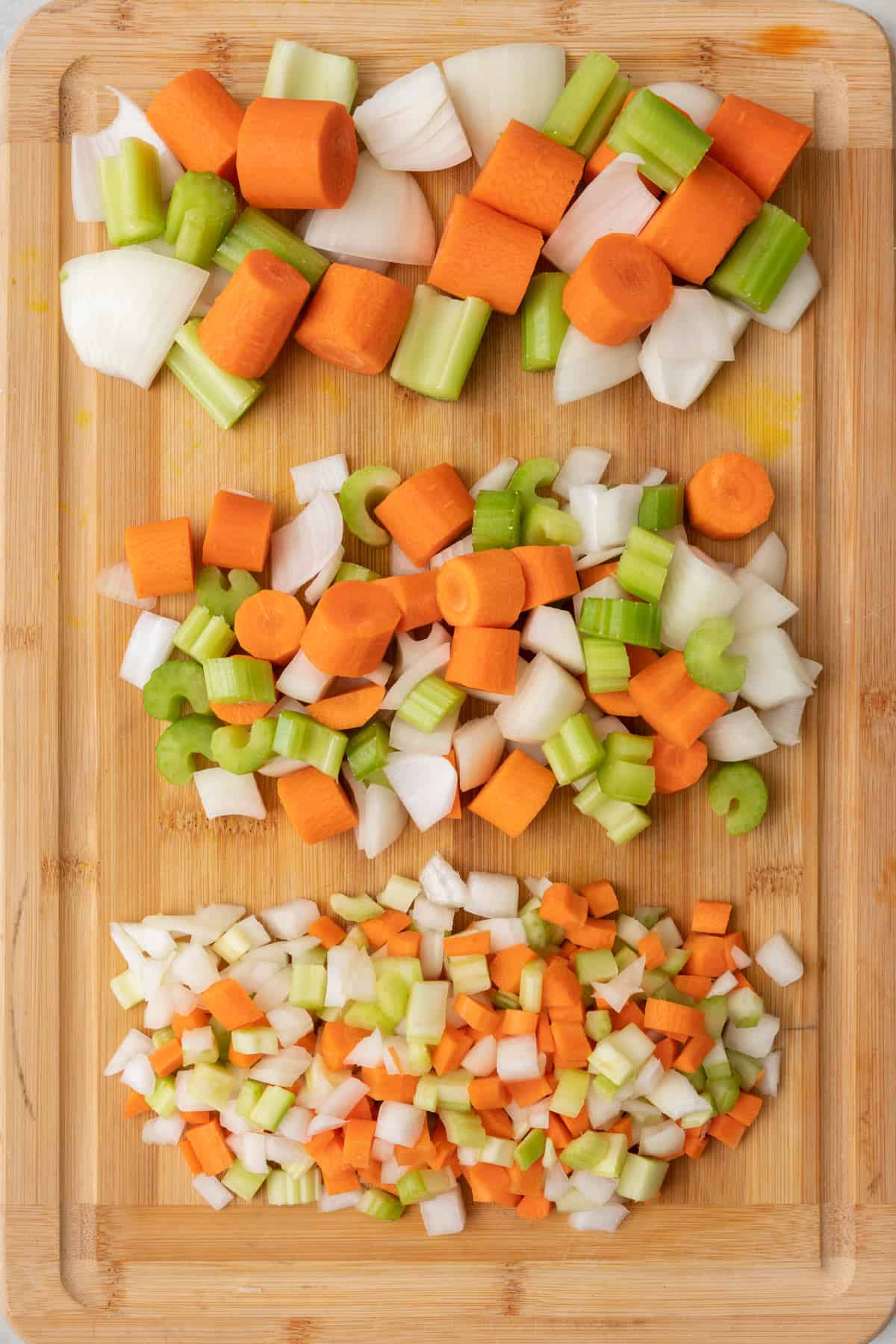
Table of Contents
Who would’ve thought that a simple combination of onions, carrots, and celery could add such depth of flavor to your favorite dishes? That’s exactly what a mirepoix does. When sauteed in oil, the veggies release their flavors and create a well-rounded and aromatic base for any recipe. Learning how to make mirepoix can make soups, and stews go from blah to so good!
WHY LEARN how to make mirepoix
- Cost-effective. Making mirepoix from scratch using fresh ingredients, compared to buying pre-packed or pre-cut veggies, is a budget-friendly way to add flavor to any dish.
- Excellent meal prep idea. Double the batch to save time during the hectic dinner hour. Having a bag of mirepoix ready to go in the freezer makes meal prep efficient and convenient, especially on busy weeknight days.
- Customizable. Mirepoix is incredibly versatile and can be used in various dishes. Making this at home gives you full control over the ingredients, and you can customize it to suit your taste preferences and the dish. Adjust the ratio, and add or omit ingredients to create a unique flavor.
- Elevate your cooking abilities. Learning how to make mirepoix is an investment in your recipe development that can empower you to create flavorful dishes, save time, and provide a foundation for various recipes.
Ingredients to make mirepoix
- Carrots: This humble root veggie offers natural sweetness that balances the savory elements. Carrots also add a pop of color, adding a pleasant visual appeal to any dish.
- Celery: Celery brings a refreshing and herbal note. It has a slightly earthy taste and fragrant aroma that adds complexity to the flavor profile.
- Onion: Provides a sweet and savory undertone. When cooked, onions release natural sugars that caramelize, adding a rich and slightly sweet flavor.
- Oil for sauteing
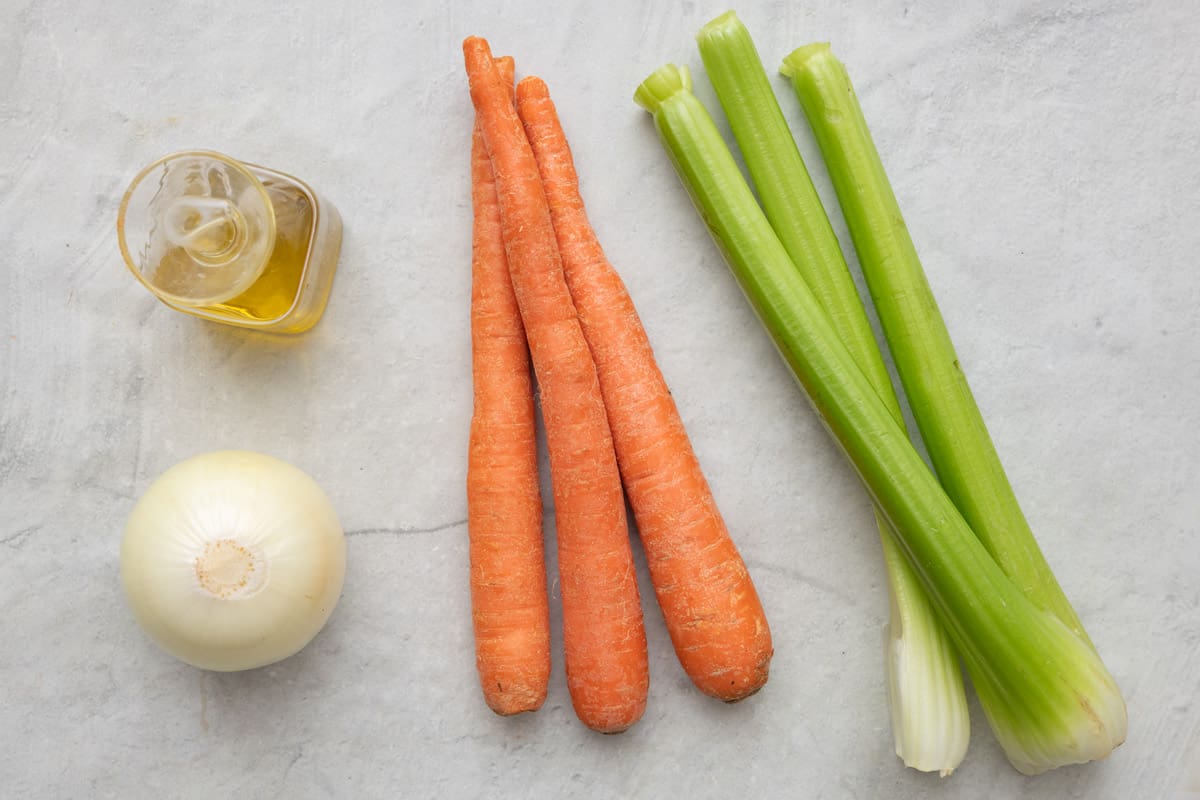
How to make mirepoix
The great thing about mirepoix is that it is a simple and forward combination of flavors. Start with common vegetables and chop them to your desired preference.
For large chunks
- Add the large chunks of chopped celery, carrots, and onions to a preheated pan with olive oil.
- Cook the vegetables, stirring frequently, until they have softened and the onions are translucent.
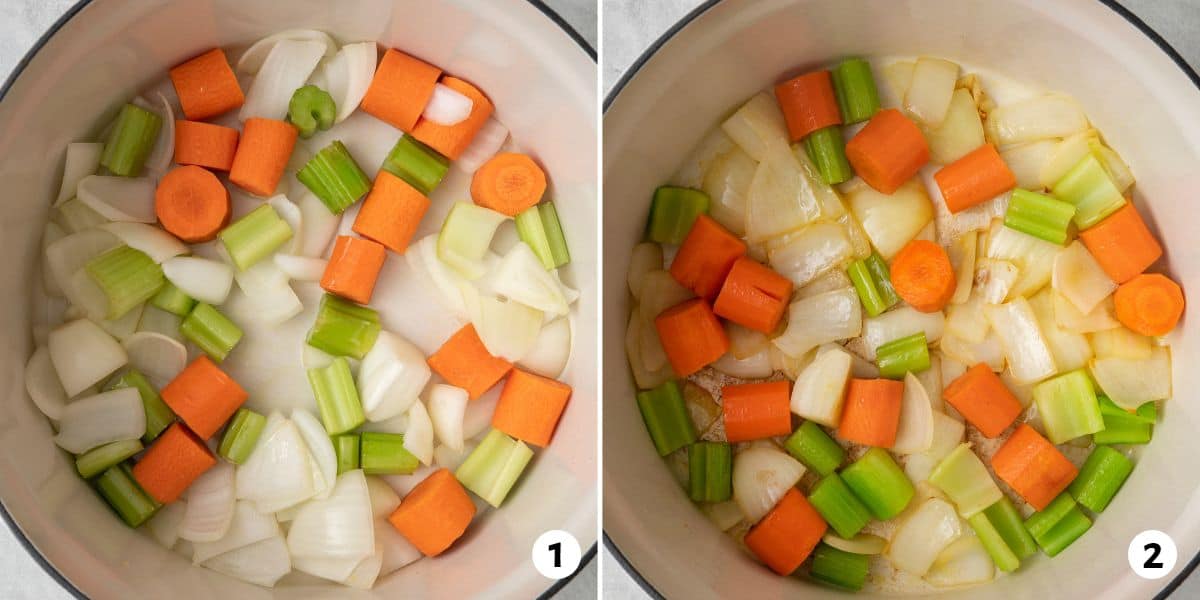
For medium-sized chunks
- Add the medium-sized chunks of chopped celery, carrots, and onions to a preheated pan with olive oil.
- Cook the vegetables, stirring frequently, until they have softened and the onions are translucent.
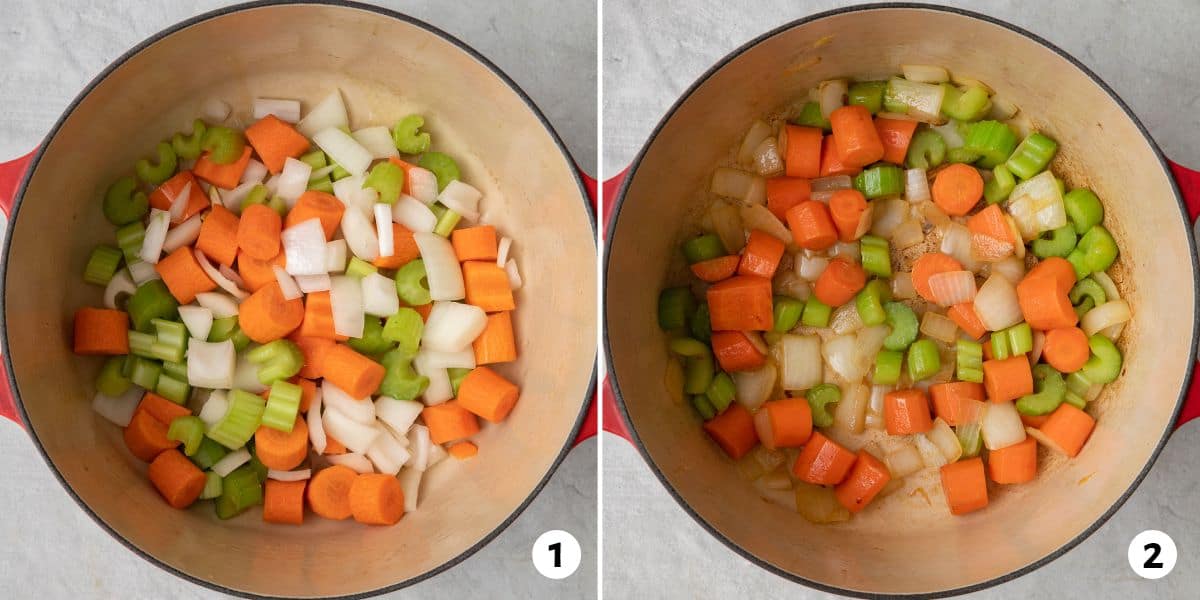
For small diced
- Add the diced celery, carrots, and onions to a preheated pan with olive oil.
- Cook the vegetables, stirring frequently, until they have softened and the onions are translucent.
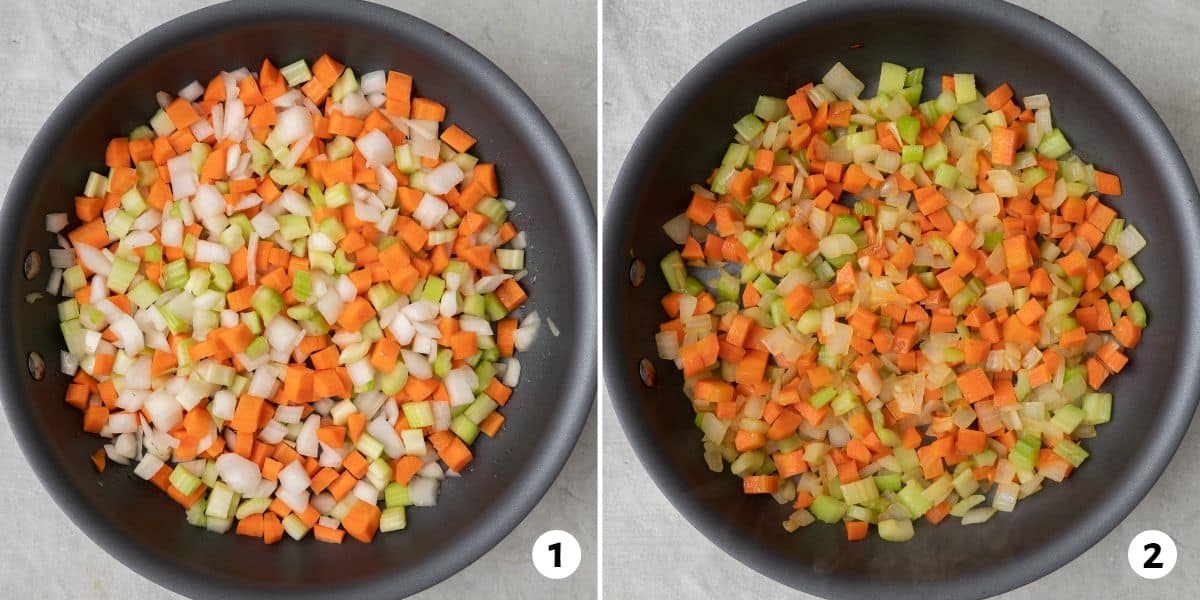
Tips for making the best mirepoix
- Cut the veggies the same size. To ensure even cooking and consistent flavor distribution, cut the onions, carrots, and celery into similarly-sized pieces depending on what size you need for your recipe.
- Watch the heat. Saute the veggies on medium heat or lower. This gentle cooking process allows the vegetables to gradually release their flavors, creating a more aromatic and flavorful mixture. Stir regularly to prevent burning or sticking.
- Don’t overcrowd the pan. To ensure proper browning and caramelization, avoid overcrowding the pan. Cook the vegetables in batches if necessary, allowing all pieces to come into contact with the heat and develop a golden color.
- Don’t rush the process. Patience is key when making mirepoix. Take your time to sweat the onions and saute the vegetables slowly. Allowing the flavors to develop gradually will result in a more flavorful blend.
RECIPES TO MAKE WITH mirepoix
- Creamy Vegetable Soup
- White Bean Soup
- Spaghetti Sauce
- Oven Baked Beef Stew
- Dry Brined Turkey Breast
- Lasagna Soup
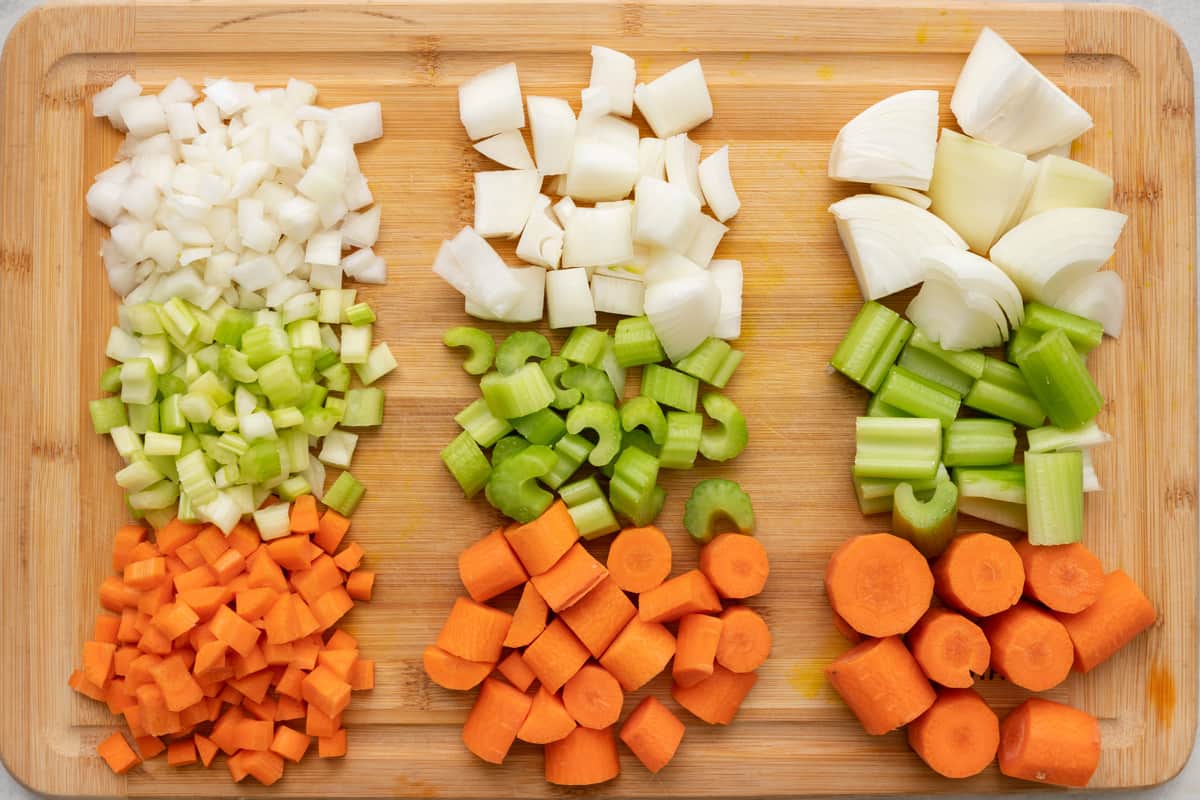
How to store & reheat mirepoix
Allow the mirepoix to cool completely to avoid condensation and moisture buildup, and transfer to an airtight container or a sealed plastic bag. Store it in the refrigerator.
To reheat, transfer the desired amount to a skillet or pot and warm over medium heat, stirring occasionally, until it is heated through.
How long will mirepoix last in the fridge?
Store in the refrigerator for up to 4 days.
Can i freeze mirepoix vegetables?
Yes! Divide the mirepoix into freezer-safe bags, squeezing out excess air before sealing them to prevent freezer burn. Gently press down to flatten the bags as much as possible to help them stack efficiently in the freezer. You can freeze for up to 6 months. Thaw overnight in the fridge or use directly from the freezer in recipes.
Frequently asked questions
While the classic mirepoix consists of 2 parts onions, 1 part carrots, and 1 part celery, feel free to adjust the ratio based on personal taste preferences and the dish you will add the veggies to. As noted in this tutorial, I prefer the mirepoix ratio set to 1 onion, 3 carrots, and 3 celery ribs for a flavorful base to add to any recipe.
Mirepoix is a flavor base used in various dishes, providing depth, aroma, and complexity. Use this in the beginning of the cooking process in soups, stocks, stews, braises, sauces, gravies, roasts, and other pan-seared dishes. It allows you to build flavor and can be added to casseroles, stir-fries, and pasta sauces, making it incredibly versatile.
Absolutely! Traditionally, mirepoix ingredients consist of onion, carrots, and celery. However, experiment with variations like leeks, garlic, and other aromatic vegetables to suit your taste and recipe.
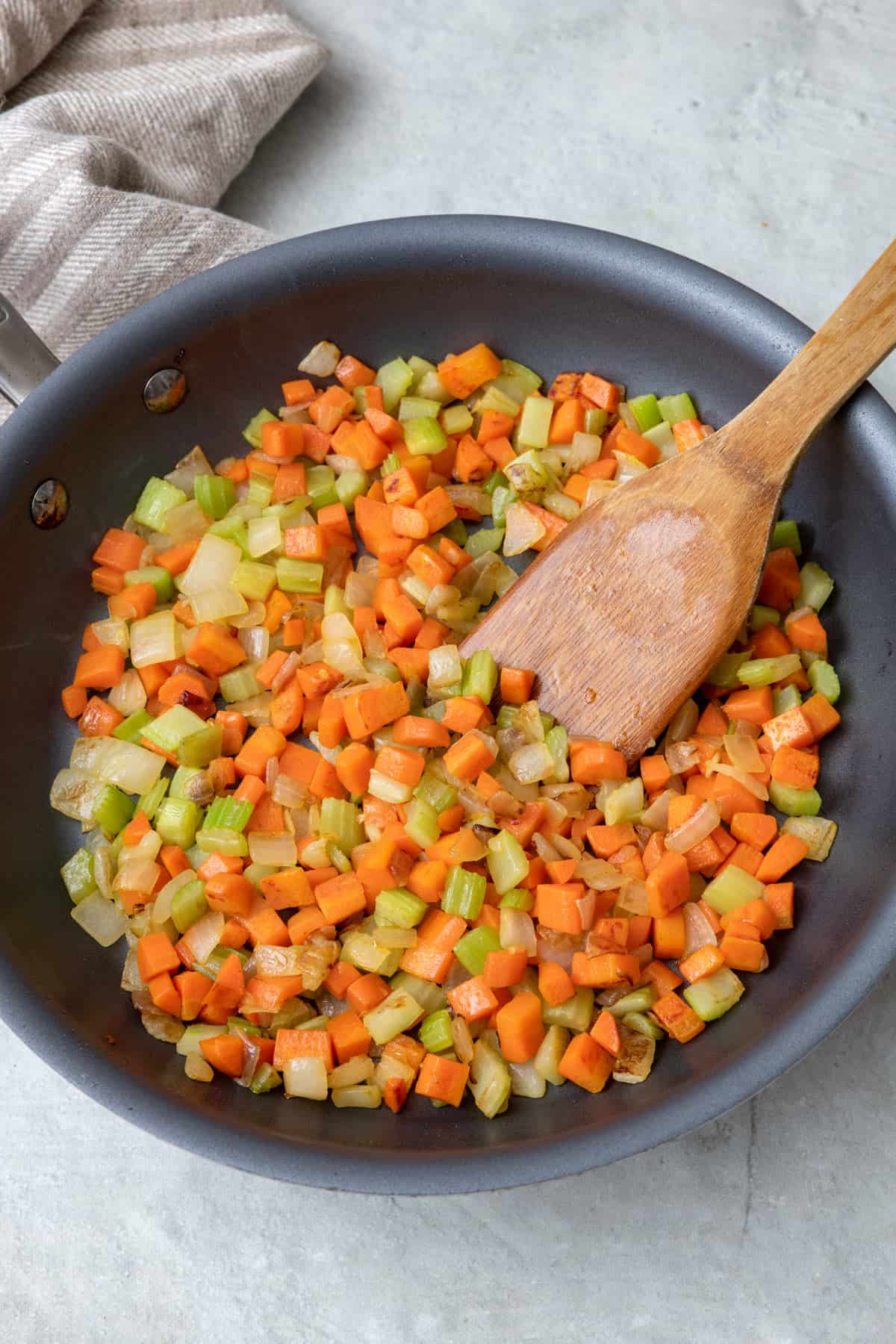
Mirepoix is a foundational ingredient in many dishes and aims to infuse flavor and aroma. You can easily elevate your favorite dish by starting with a basic mirepoix vegetable mix. So try this trifecta for a flavor base that is well-rounded, aromatic, and can enhance the taste of any dish.
More vegetable cutting recipes:
- How to Cut Mushrooms
- How to Cut Butternut Squash
- How to Cut Sweet Potatoes
- How to Peel and Cut Fresh Ginger
- How to Cut Fennel Bulb
- How to Cut Beets
- How to Cut Asparagus
- How to Cut Shallots
- How to Cut Eggplant
If you found this tutorial for How to Make Mirepoix helpful or if you try any recipe on Feel Good Foodie, then don’t forget to rate the recipe and leave a comment below! It helps others who are thinking of trying out this tutorial and we would love to hear about your experience. And if you snapped some shots, share it on Instagram so we can repost on Stories!

order MY book
The Feel Good Foodie Cookbook is now available everywhere books are sold!
Amazon TargetBarnes & Noble Books A Million Hudson Booksellers BookshopSCHULER Books

How to Make Mirepoix
Ingredients
- 1 large onion
- 3 celery sticks
- 3 carrot sticks
- 1 tablespoon olive oil
Instructions
- Chop the vegetables depending on the recipe you are using them for:
- For large-size chunks, ideal for stock, broth or blended soups, roughly chop the vegetables into 1-inch cubes.
- For medium-sized chunks, ideal for soups and stews, cut the vegetables into ½-inch cubes. You can leave the celery and carrots sliced, or cut them half lengthwise and then cut into cubes.
- For small dice, ideal for sauces or pilafs, cut the vegetables into ¼-inch cubes.
- Heat the olive oil in a medium or large skillet or pot, over medium heat. Add the onions, celery and carrots, and stir to coat with the olive oil. Cook, stirring frequently, until the vegetables have softened and the onions are translucent, about 10 minutes.
- Continue with the recipe as desired, or allow the mirepoix to cool completely and freeze flat in freezer-safe zip top bags.
Notes
- Dice the vegetables into similar sizes for even cooking.
- Watch the heat to prevent burning or sticking, and allow the mirepoix vegetables to release their flavors gradually.
- Don’t overcrowd the pan to ensure even browning, and take your time to sweat the onions and saute the vegetables slowly for the best flavor and texture.
Nutrition
Nutrition information provided is an estimate. It will vary based on cooking method and specific ingredients used.





